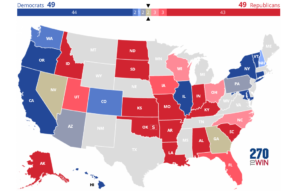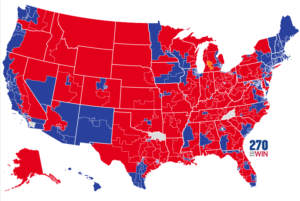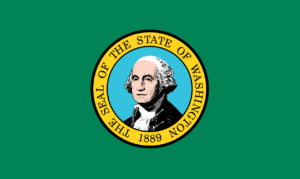As we prepare for the 2020 elections, Yesh Ginsburg and Steen Kirby will give a general overview of all 435 United States House of Representatives races. This is a basic overview to introduce you to the major candidates. All Partisan Lean numbers are taken from the Cook Partisan Voting Index. We will update this page as the races progress if anything noteworthy arises.
We’ve finally arrived to the end of California, where the state’s Republican districts reside. Of course, Republicans currently only control one of these eight seats, but based on the partisan lean they should be competitive in three of them. Let’s meet the candidates for these seats in November.
California is the most populous state in the nation, with its whopping 53 Congressional Districts. 45 of those currently sit in the hands of Democrats. Of the nine we’ll be looking at in this article, every single one is held by a Democrat. What will the Representatives be like from these districts? Let’s introduce them.
Remember, California runs on a “jungle primary” system. On March 3rd, every candidate interested in running for Congress appeared on the ballot. The top two in each race advanced to the November general election, so there are no write-ins and no third candidates. In some districts, the top two primary candidates are from the same party.
Because of California’s size, we are not putting every candidate in one article. In fact, it takes us six articles to get through all of them. This article looks over Districts 46-53, but we also have gone over all the other districts, linked below.
Districts 1-9
Districts 10-18
Districts 19-27
Districts 28-36
Districts 37-45
California’s 46th Congressional District
Incumbent:ּ Lou Correa (Democrat, second term)
Partisan Lean: D+15
2018 Results:
| Candidate | Votes | % |
| Lou Correa (D) | 102,278 | 69.15 |
| Russell Rene Lambert (R) | 45,638 | 30.85 |
2016 Results:
| Candidate | Votes | % |
| Lou Correa (D) | 115,248 | 70.02 |
| Bao Nguyen (D) | 49,345 | 29.98 |
Republican Candidate:
James Waters (campaign website)
Waters is running a “family values” campaign. Not only is he campaigning against laws that he feels would prioritize LGBT issues over religious freedoms, but he is running on the notion that encouraging and strengthening marriage and families will be the main starting point from which fixing most problems will flow. Other than that, he seems to have a standard relatively moderate Republican campaign, including a pathway to citizenship for DACA recipients.
Democratic Candidate:
Lou Correa (campaign website)
Correa doesn’t have a platform on his website, but he doesn’t need one. Voters like him, and by now they know him well. Correa is a centrist Democrat, and one of the 25 members of the Blue Dog Coalition.
California’s 47th Congressional District
Incumbent: Alan Lowenthal (Democrat, fourth term)
Partisan Lean: D+13
2018 Results:
| Candidate | Votes | % |
| Alan Lowenthal (D) | 143,354 | 64.86 |
| John Briscoe (R) | 77,682 | 35.14 |
2016 Results:
| Candidate | Votes | % |
| Alan Lowenthal (D) | 154,759 | 63.72 |
| Andy Whallon (R) | 88,109 | 36.28 |
Republican Candidate:
John Briscoe (campaign website)
Briscoe is a libertarian-leaning Republican who identifies himself as an “America First” conservative. He, like so many libertarian-leaning Republicans, shaped his political philosophy around Atlas Shrugged. The district rejected these ideas of his two years ago, and it’s hard to see anything other than the same thing happening again.
Democratic Candidate:
Alan Lowenthal (campaign website)
Lowenthal hasn’t updated his website since his last election, but it doesn’t matter much. He’s popular here, and his focus on climate issues seems to resonate. He’s a popular Congressman and shouldn’t have any trouble, especially with this opponent.
California’s 48th Congressional District
Incumbent: Harley Rouda (Democrat, first term)
Partisan Lean: R+4
2018 Results:
| Candidate | Votes | % |
| Harley Rouda (D) | 157,837 | 53.56 |
| Dana Rohrabacher (R) | 136,899 | 46.44 |
2016 Results:
| Candidate | Votes | % |
| Dana Rohrabacher (R) | 178,701 | 58.32 |
| Suzanne Joyce Savary (D) | 127,715 | 41.68 |
Republican Candidate:
Michelle Steel (campaign website)
This is one of the few true battlegrounds in California. Republicans are pouring money into this race to try and take back a seat that Rouda flipped in 2018. Steel, the current Chair of the Orange County Board of Supervisors, is running as a center-right Republican, but taking a strong non-Trump line on COVID-19.
Yesh’s notes: Steele is long on platitudes right now and short on policy details, as she tries to thread the tight needle between appealing to the more liberal areas of this purple district while at the same time not alienating the more right-wing segments.
Democratic Candidate:
Harley Rouda (campaign website)
Rouda, a liberal but not quite progressive Democrat, flipped this seat from six-term Republican Dana Rohrabacher after the Republican turned far enough to the right that the district finally rejected him. This is a barely-right-leaning swing district, so Rouda’s incumbency should cancel out the slight partisan lean of the district. This will definitely be a race to watch in November.
Steen’s Notes: Rouda would lose if Trump wasn’t on the ballot, but once again he’s toxic in the nation’s largest state and Steel should come up short.
California’s 49th Congressional District
Incumbent: Mike Levin (Democrat, first term)
Partisan Lean: R+1
2018 Results:
| Candidate | Votes | % |
| Mike Levin (D) | 166,453 | 56.42 |
| Diane Harkey (R) | 128,577 | 43.58 |
2016 Results:
| Candidate | Votes | % |
| Darrell Issa (R) | 155,888 | 50.27 |
| Doug Applegate (D) | 154,267 | 49.73 |
Republican Candidate:
Brian Maryott (campaign website)
Maryott is trying to reclaim this left-moving district, but he has nowhere near the financial backing of, say, Steel in the 48th District. He is running on a moderate Republican platform, though is a bit further to the right on supporting the military. He will face an uphill battle in this race, but it has the potential to be competitive.
Democratic Candidate:
Mike Levin (campaign website)
Levin flipped this district in 2018 after the retirement of Darrell Issa, who had held the seat since 2001. Levin is not quite a Bernie Sanders progressive, though he does support Medicare for All and some other progressive programs. He is a bit further left than the district as a whole, but the district is moving in his direction, and the Trump factor will likely keep him in office.
California’s 50th Congressional District
Incumbent: None
Partisan Lean: R+11
2018 Results:
| Candidate | Votes | % |
| Duncan Hunter (R) | 134,362 | 51.68 |
| Ammar Campa-Najjar (D) | 125,448 | 48.32 |
2016 Results:
| Candidate | Votes | % |
| Duncan Hunter (R) | 179,937 | 63.45 |
| Patrick Malloy (D) | 103,646 | 36.55 |
Republican Candidate:
Darrell Issa (campaign website)
Issa came out of retirement to try to hold this seat, which is now in danger since Duncan Hunter’s resigned after misusing campaign funds. Issa is a Trump-friendly Republican, campaigning on building the wall, supporting Trump, and fighting Nancy Pelosi and Adam Schiff. Issa is also spending his huge war chest, which he had plenty of time to build up in a safe seat.
Yesh’s notes: Issa seems to be banking on the fact that this is still a Republican district. He’s hoping that the very tight 2018 election was due to Hunter’s ethics issues, and not due towards antipathy towards President Trump. It’s a risky proposition, but it might pay off.
Democratic Candidate:
Ammar Campa-Najjar (campaign website)
People thought Campa-Najjar was a progressive in 2018, likely because of his pledge to not take corporate money, but he’s clearly a moderate Democrat. He supports expanding Medicare, is a hard-line deficit hawk, and is middle-of-the-road on climate change. Campa-Najjar faced significant negative campaigning in 2018 due to the fact that his grandfather founded the Fatah Party along with Yasser Arafat, and was alleged to have masterminded the Munich massacre. Campa-Najjar has condemned these actions of his grandfather, though he said he was open to new information when an Israeli historian released a book claiming he wasn’t involved.
Steen’s Notes: Since Hunter is no longer on the ballot the air has come out of Campa-Najjar’s campaign a bit. He should put up a credible result but be short of 50% in this still conservative district.
California’s 51st Congressional District
Incumbent: Juan Vargas (Democrat, fourth term)
Partisan Lean: D+22
2018 Results:
| Candidate | Votes | % |
| Juan Vargas (D) | 109,527 | 71.2 |
| Juan Hidalgo Jr. (R) | 44,301 | 28.8 |
2016 Results:
| Candidate | Votes | % |
| Juan Vargas (D) | 145,162 | 72.75 |
| Juan Hidalgo Jr. (R) | 45,362 | 27.25 |
Republican Candidate:
Juan Hidalgo Jr. (campaign website)
Hidalgo seems to be becoming a perennial candidate in an unwinnable seat. He campaigns on his military record and his desire to serve, and he hoped that could strike a chord in a deep blue district. So far, it hasn’t.
Democratic Candidate:
Juan Vargas (campaign website)
Vargas is a moderate Democrat who focuses, among his other main topics, on the environment. He is taking this campaign seriously, even though it’s a safe seat, and has spent almost the entirety of his approximately half-million in campaign funds.
California’s 52nd Congressional District
Incumbent: Scott Peters (Democrat, fourth term)
Partisan Lean: D+6
2018 Results:
| Candidate | Votes | % |
| Scott Peters (D) | 188,992 | 63.85 |
| Omar Qudrat (R) | 107,015 | 36.15 |
2016 Results:
| Candidate | Votes | % |
| Scott Peters (D) | 181,253 | 56.53 |
| Denise Gitsham (R) | 139,403 | 43.47 |
Republican Candidate:
Jim DeBello (campaign website)
DeBello is taking this race seriously, spending as if it’s really in play. He’s definitely running behind in a district that will be tough to flip, but he’s trying and running on a moderate Republican campaign.
Democratic Candidate:
Scott Peters (campaign website)
Peters is a moderate Democrat who touts his bipartisan record and success in the district. He barely won this seat his first two elections, but has easily run away with it since. Maybe DeBello can make it competitive again, but with current trends and in the Trump era, it doesn’t seem likely.
California’s 53rd Congressional District
Incumbent: Susan Davis (Democrat, tenth term)
Partisan Lean: D+14
2018 Results:
| Candidate | Votes | % |
| Susan Davis (D) | 185,667 | 69.07 |
| Morgan Murtaugh (R) | 83,127 | 30.93 |
2016 Results:
| Candidate | Votes | % |
| Susan Davis (D) | 188,998 | 67.01 |
| James Veltmeyer (R) | 97,968 | 32.99 |
Republican Candidate:
No Republican qualified for the general election.
Democratic Candidates:
Georgette Gomez (campaign website)
Sarah Jacobs (campaign website)
You wouldn’t expect a D+14 district to get two Democrats into the general election, but that’s what happened. This isn’t even a standard “establishment vs progressive” intra-Democratic race. Both candidates support Medicare for All and the Green New Deal. Policy-wise, there’s not a ton to separate the two. Jacobs is far better funded and has seriously outspent Gomez so far, though.
Steen’s Notes: Jacobs family is trying hard for the second time to buy her a seat in Congress. It didn’t work in 2018, and this time many on the left have rallied behind Gomez, who has a far better story. This is a Dem vs Dem toss up.
Overview
Democrats control seven of these eight seats, and the one Republican seat is currently empty. Democrats will almost certainly win at least six of these races, with a solid chance at all eight.
Interested in the rest of our primers for other House races? We have them all listed on our primer home page.







